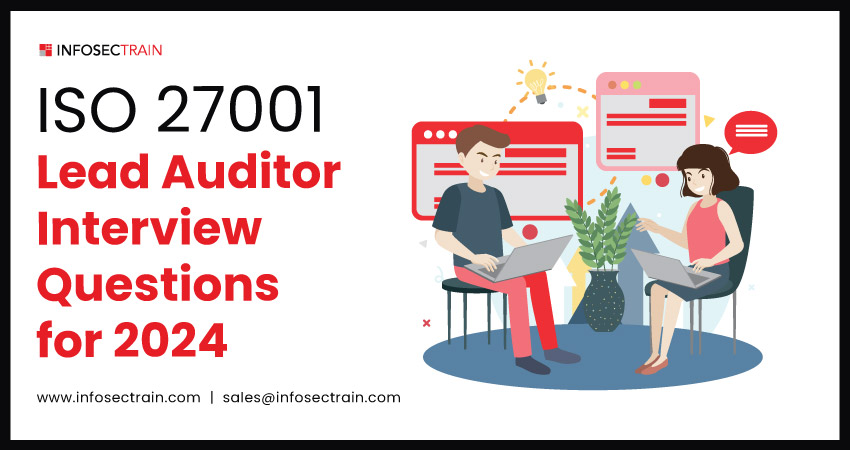ISO 27001 Lead Auditor Interview Questions for 2024
ISO 27001 is an internationally recognized standard that provides guidelines for organizations to systematically and cost-effectively protect their information through an Information Security Management System (ISMS). The position of an ISO 27001 Lead Auditor is crucial, encompassing responsibilities such as evaluating compliance with ISMS, demonstrating auditing expertise, staying abreast of evolving threats, and spearheading ongoing security improvements.

When hiring an ISO 27001 Lead Auditor in 2024, it’s important to check their knowledge of the ISO 27001 standards, current cybersecurity trends, risk management abilities, and skills to improve an organization’s information security management system (ISMS). When interviewing for an ISO 27001 Lead Auditor, the interviewer evaluates candidates:
- In-depth knowledge of ISO 27001 standards
- Problem-solving abilities for complex information security issues
- Familiarity with the latest cybersecurity technologies and compliance requirements
ISO 27001 Lead Auditor Interview Questions
1. What does an ISO 27001 Lead Auditor do?
An ISO 27001 Lead Auditor is a key person who plans, conducts, and reports on ISO 27001 audits. They must have a deep understanding of the standard and be able to apply audit principles and procedures to assess an organization’s compliance with it.
2. What are the steps involved in planning an ISO 27001 audit?
The steps involved in planning an ISO 27001 audit include:
- Defining the scope of the audit: Determining the areas of the organization that will be audited.
- Developing the audit plan: Creating a detailed plan for the audit, including the audit schedule, audit team, and audit methodology.
- Preparing the audit documentation: Developing the audit tools and templates used during the audit.
3. What are the key audit techniques used in ISO 27001 audits?
The key audit techniques used in ISO 27001 audits include:
- Interviews: Talking to employees about their roles and responsibilities and how they implement security controls.
- Document review: Reviewing documentation such as security policies, procedures, and records.
- Risk Assessment: An essential audit component involves evaluating the organization’s process for identifying, analyzing, and treating risks. Auditors review how risks are assessed, the criteria for accepting risks, and how mitigation strategies are implemented. They also check whether the risk treatment aligns with the organization’s risk appetite.
- Observation: Observing how employees work and how they implement security controls.
4. How does a Lead Auditor assess an organization’s compliance with ISO 27001?
An ISO 27001 Lead Auditor will assess an organization’s compliance with ISO 27001 by considering the following factors:
- The organization’s compliance with the core controls of ISO 27001.
- The effectiveness of the organization’s security controls.
- The organization’s risk management process.
- The organization’s security awareness and training program.
- The organization’s incident management process.
5. What is the importance of non-conformities in an ISO 27001 audit?
Non-conformities are identified as non-compliance with the ISO 27001 standard. They are important because they indicate areas where the organization’s security posture can be improved.
6. What is the difference between an ISO 27001 audit and an ISO 27001 certification audit?
An ISO 27001 audit is an internal review done by the organization itself to check if they are following the ISO 27001 information security standard. An ISO 27001 certification audit is an external audit carried out by an accredited third-party auditing firm. This audit determines if the organization qualifies for official ISO 27001 certification.
7. What is the purpose of an ISO 27001 gap analysis?
An ISO 27001 gap analysis is a process that identifies the differences between an organization’s current security posture and the requirements of the ISO 27001 standard. This information can then be used to develop a plan for implementing the ISO 27001 standard.
8. How does risk assessment differ from risk management?
Risk assessment involves identifying, analyzing, and prioritizing the possible threats and vulnerabilities that could compromise an organization’s information security. Risk management is the process of putting measures in place to reduce or address those identified information security risks and threats.
Or
Risk assessment = Identifying and prioritizing cybersecurity risks/dangers
Risk management = Taking actions to lower or prevent those cybersecurity risks from happening
9. What is the purpose of an ISO 27001 Statement of Applicability (SOA)?
The ISO 27001 Statement of Applicability (SOA) is a fundamental document within an Information Security Management System (ISMS) that lists and justifies the security controls an organization has implemented or excluded based on its specific risk environment. It serves multiple critical functions:
- It shows how control selections are linked to identified risks and their treatment
- It provides a rationale for these decisions and serves as a key reference in compliance audits.
10. What is the purpose of an ISO 27001 Management Review?
An ISO 27001 Management Review is a periodic review of the organization’s ISMS. The objective of the Management Review is to verify the effectiveness of the ISMS in achieving the information security goals of the organization.
11. What is the difference between an ISO 27001 Lead Auditor and an ISO 27001 Implementation Consultant?
An ISO 27001 Lead Auditor is responsible for planning, conducting, and reporting on ISO 27001 audits. An ISO 27001 Implementation Consultant is responsible for helping organizations to implement the ISO 27001 standard.
12. Describe the different types of ISO 27001 audits.
There are three main types of ISO 27001 audits:
- Internal audits: An organization’s internal audit team performs these audits to evaluate the organization’s adherence to the ISO 27001 standard.
- First-party certification audits: These audits are conducted by an organization’s chosen certification body to assess the organization’s readiness for ISO 27001 certification.
- Surveillance audits: A surveillance audit is meant to confirm that an organization is still living up to the promises it made when first received ISO certification.
13. How do lead auditors handle non-conformities identified during an ISO 27001 audit?
Non-conformities are identified as non-compliance with the ISO 27001 standard. When a non-conformity is identified, the auditor should discuss the non-conformity with the auditee and determine the root cause of the non-conformity. The auditor should then make recommendations for corrective action to address the non-conformity.
14. How do Lead Auditors ensure that their audit findings are objective and unbiased?
Lead Auditors should maintain objectivity and impartiality throughout the audit process. This can be achieved by:
- Disclosing any potential conflicts of interest
- Avoiding collusion with the auditee
- Basing audit findings on evidence and not on speculation
- Avoiding personal opinions or biases
15. What is the importance of continuous improvement in ISO 27001 auditing?
The process of ongoing enhancement is a crucial element within ISO 27001 auditing. Auditors should continuously seek ways to improve their audit methodologies and techniques. This can be achieved by:
- Participating in training and professional development opportunities.
- Sharing best practices with other auditors.
- Reviewing and updating audit methodologies and techniques regularly.
16. What are some of the ethical considerations for ISO 27001 auditors?
Auditors should adhere to high ethical standards. This includes:
- Maintaining confidentiality of audit findings
- Avoiding conflicts of interest
- Acting with integrity and professionalism
- Respecting the auditee’s privacy
17. How do Lead Auditors assess an organization’s compliance with the ISO 27001 Annex A controls?
The Annex A controls are a set of optional controls that can be used to implement the ISO 27001 standard. When assessing an organization’s compliance with the Annex A controls, the auditor should consider the organization’s specific needs and risks.
18. Which metrics are considered essential for assessing the efficiency of an ISO 27001 Information Security Management System (ISMS)?
Several primary metrics exist for gauging the effectiveness of an ISO 27001 ISMS, such as:
- The number of identified information security risks.
- The number of implemented information security controls.
- The number of information security incidents.
- The cost of information security incidents.
19. How do Lead Auditors handle situations lacking documentation or evidence to support an organization’s claims of compliance with ISO 27001?
When there is a lack of documentation or evidence, the auditor should use other methods to gather evidence, such as interviews, observations, and testing. The auditor should take into account the organization’s comprehensive risk management stance and the probability of the organization’s adherence to the ISO 27001 standard.
20. What is the concept of IT General Controls (ITGCs)?
IT General Controls (ITGCs) form the fundamental framework that oversees an organization’s entire IT environment, encompassing operational controls, system development, change management, and access. These controls serve as the cornerstone for ensuring the reliability and security of IT systems.
Become a ISO 27001 Lead Auditor with InfosecTrain
InfosecTrain stands out as a leading provider of IT security training, offering a comprehensive curriculum tailored explicitly for ISO 27001 certification. For those aiming to ace the ISO 27001 Lead Auditor certification exam and interview, enrolling in InfosecTrain’s ISO 27001 Lead Auditor certification training course is an invaluable investment. Our comprehensive courses equip you with the essential knowledge and practical skills to confidently demonstrate your expertise in implementing and auditing ISO 27001 information security management systems. Don’t miss this opportunity to enhance your competitive advantage and realize your potential as an ISO 27001 Lead Auditor.
TRAINING CALENDAR of Upcoming Batches For ISO 27001 : 2022 LA
| Start Date | End Date | Start - End Time | Batch Type | Training Mode | Batch Status | |
|---|---|---|---|---|---|---|
| 31-May-2025 | 06-Jul-2025 | 19:00 - 23:00 IST | Weekend | Online | [ Open ] | |
| 21-Jun-2025 | 27-Jul-2025 | 09:00 - 13:00 IST | Weekend | Online | [ Open ] | |
| 26-Jul-2025 | 31-Aug-2025 | 19:00 - 23:00 IST | Weekend | Online | [ Open ] | |
| 23-Aug-2025 | 21-Sep-2025 | 19:00 - 23:00 IST | Weekend | Online | [ Open ] |







 1800-843-7890 (India)
1800-843-7890 (India)